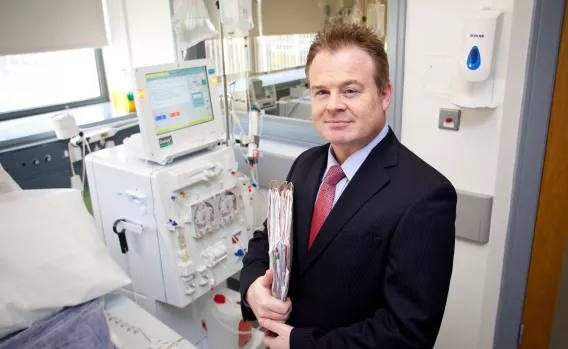
Professor Austin Stack, Chair of Medicine, Graduate Entry Medical School is taking on the battle against kidney disease. In his research, Professor Stack is looking to address the impact of kidney disease in large populations. He currently is exploring methods of predicting kidney disease progression and the identification of novel biomarkers that may facilitate earlier diagnosis of cardiovascular disease in chronic kidney disease.
Professor Stack, Consultant Nephrologist at Mid Western Regional Hospital, explains; "Within Ireland, there are almost 4,000 individuals with a kidney transplant or receiving dialysis who have developed end stage kidney disease (ESKD) and each year 400 plus patients start dialysis treatment. Even more alarming, we estimate that between 10-20% of the adult population have some form of kidney disease and these people are at risk of cardiovascular disease and progression to kidney failure. What people may not know is that kidney disease is silent for many—with few if any symptoms and can only be diagnosed with a blood or urine test."
Improving awareness of the disease is important; screening of high-risk individuals is also desirable in order to allow earlier detection, the identification of risk factors, and the monitoring of the effectiveness of treatments is crucial. These are all important and our research programme here at the University of Limerick plays a vital role in contributing to these efforts and our understanding of Kidney Disease.
Our team is leading on a number of initiatives to reduce the risk of developing kidney disease and to improve the outcomes of people who unfortunately may have developed kidney failure.
1. We are developing the first National Surveillance System for tracking Kidney Disease in Ireland in partnership with the HSE and University of Michigan, University College Cork.
2. We have assembled large cohorts of patients from the United States Renal Data System (USRDS) to evaluate the effectiveness of interventions for people who are on dialysis or have a kidney transplant.
3. Our team, in collaboration with the University of Texas Medical School are evaluating new and potentially modifiable risk factors for cardiovascular disease in patients with kidney disease in order to improve patient’s survival
The Graduate Entry Medical School, UL is leading a number of national and international projects to evaluate the health status and clinical outcomes for patients with chronic disease in order to improve patient outcomes.